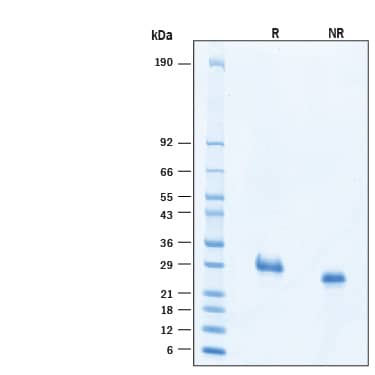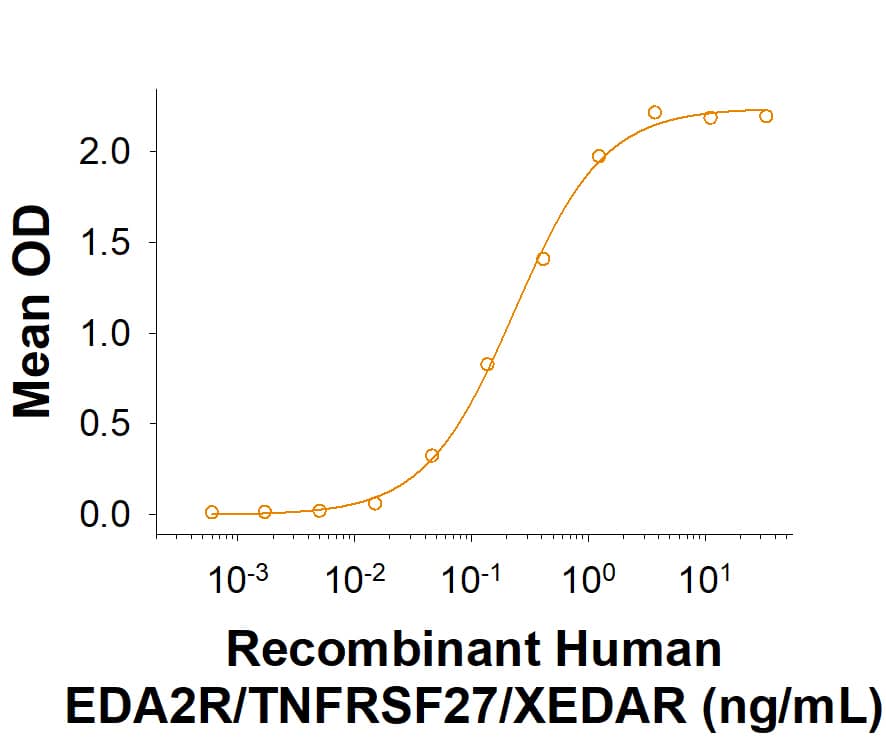Recombinant Human EDA2R/TNFRSF27/XEDAR His-tag Protein, CF
R&D Systems, part of Bio-Techne | Catalog # 11358-XD

Key Product Details
Product Specifications
Source
Chinese Hamster Ovary cell line, CHO-derived human EDA2R/TNFRSF27/XEDAR protein
Met1-Glu136, with a C-terminal 6-His tag
Met1-Glu136, with a C-terminal 6-His tag
Purity
>95%, by SDS-PAGE visualized with Silver Staining and quantitative densitometry by Coomassie® Blue Staining.
Endotoxin Level
<0.10 EU per 1 μg of the protein by the LAL method.
N-terminal Sequence Analysis
Met1
Predicted Molecular Mass
16 kDa
SDS-PAGE
26-30 kDa, under reducing conditions.
Activity
Measured by its binding ability in a functional ELISA.
When Recombinant Human EDA-A2/Ectodysplasin A2 (Catalog # 922-ED/CF) is immobilized at 1 µg/mL (100 µL/well), Recombinant Human EDA2R/TNFRSF27/XEDAR His-tag (Catalog # 11358-XD) binds with an ED50 of 40.0-500 ng/mL.
When Recombinant Human EDA-A2/Ectodysplasin A2 (Catalog # 922-ED/CF) is immobilized at 1 µg/mL (100 µL/well), Recombinant Human EDA2R/TNFRSF27/XEDAR His-tag (Catalog # 11358-XD) binds with an ED50 of 40.0-500 ng/mL.
Scientific Data Images for Recombinant Human EDA2R/TNFRSF27/XEDAR His-tag Protein, CF
Recombinant Human EDA2R/TNFRSF27/XEDAR His-tag Protein Binding Activity.
When Recombinant Human EDA-A2/Ectodysplasin A2 (922-ED/CF) is immobilized at 1 µg/mL (100 µL/well), Recombinant Human EDA2R/TNFRSF27/XEDAR His-tag Protein (Catalog # 11358-XD) binds with an ED50 of 40.0-500 ng/mL.Recombinant Human EDA2R/TNFRSF27/XEDAR His-tag Protein SDS-PAGE.
2 μg/lane of Recombinant Human EDA2R/TNFRSF27/XEDAR His-tag Protein (Catalog # 11358-XD) was resolved with SDS-PAGE under reducing (R) and non-reducing (NR) conditions and visualized by Coomassie® Blue staining, showing bands at 26-30 kDa.Formulation, Preparation and Storage
11358-XD
| Formulation | Lyophilized from a 0.2 μm filtered solution in PBS with Trehalose. |
| Reconstitution | Reconstitute at 500 μg/mL in PBS. |
| Shipping | The product is shipped at ambient temperature. Upon receipt, store it immediately at the temperature recommended below. |
| Stability & Storage | Use a manual defrost freezer and avoid repeated freeze-thaw cycles.
|
Background: EDA2R/TNFRSF27/XEDAR
References
- Pfeffer, K. (2003) Cytokine Growth Factor Rev. 14:185.
- Yan, M. et al. (2000) Science 290:523.
- Sinha, S.K. et al. (2002) J. Biol. Chem. 277:44953.
- Tanikawa, C. et al. (2010) Mol. Cancer Res. 8:855.
- Mikkola, M.L. (2009) Am. J. Med. Genet. 149A:2031.
- Prodi, D.A. et al. (2008) J. Invest. Dermatol. 128:2268.
- Tanikawa, C. et al. (2009) Oncogene 28:3081.
- Newton, K. et al. (2004) Mol. Cell. Biol. 24:1608.
- Sinha, S.K. and P.M. Chaudhary (2004) J. Biol. Chem. 279:41873.
- Brosh, R. et al. (2010) FEBS Lett. 584:2473.
- Punj, V. et al. (2010) Clin. Cancer Res. 16:1140.
- Chang, B. et al. (2007) Cancer Gene Ther. 14:927.
Long Name
Ectodysplasin A2 Receptor
Alternate Names
EDAA2R, TNFRSF27, XEDAR
Gene Symbol
EDA2R
UniProt
Additional EDA2R/TNFRSF27/XEDAR Products
Product Documents for Recombinant Human EDA2R/TNFRSF27/XEDAR His-tag Protein, CF
Product Specific Notices for Recombinant Human EDA2R/TNFRSF27/XEDAR His-tag Protein, CF
For research use only
